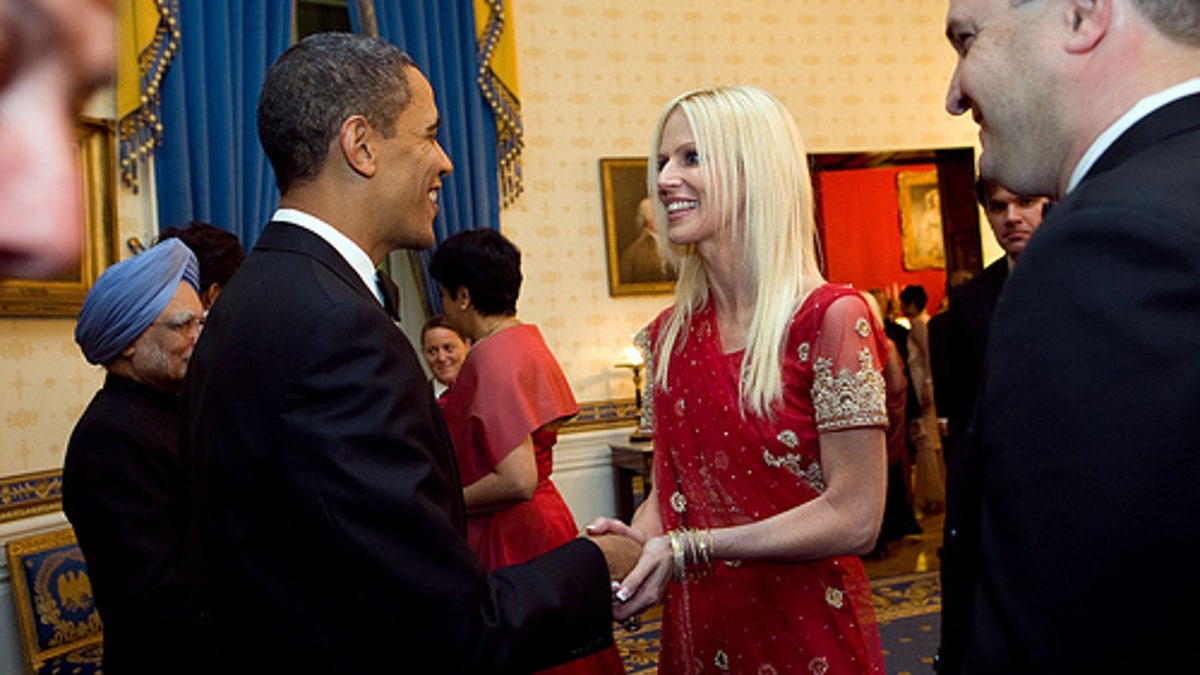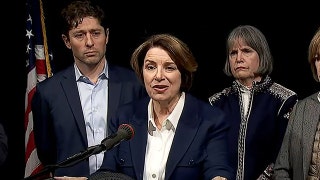
Nov. 24, 2009: President Barack Obama greets Michaele and Tareq Salahi during a receiving line in the Blue Room of the White House before the State Dinner with Prime Minister Manmohan Singh of India. (White House)
What started out as a simple and comical case of party-crashing could turn into a constitutional fight between the president of the United States and Congress.
The top Republican on the House Homeland Security Committee said Thursday that he will ask to subpoena White House Social Secretary Desiree Rogers to appear before the panel, which is investigating last week's "gate-crashing" by a couple who attended President Obama's first state dinner uninvited.
But the White House on Wednesday said it does not make aides to the president available to testify, raising concerns that the Obama administration's professed commitment to transparency may soon devolve into a battle over executive privilege.
Rep. Peter King of New York said he's unlikely to request a subpoena immediately, but said Rogers absolutely must testify to Congress on her role in the security breach at the White House.
"At the appropriate time I will move to subpoena Desiree Rogers," King said.
"Certainly, it is an option" to subpoena Rogers, added Rep. Charles Dent, R-Pa., who serves on the committee.
Committee Chairman Bennie Thompson, D-Miss., stressing that "both sides" must be heard, said on Thursday that he may have the votes to subpoena Tareq and Michaele Salahi, the couple who crashed the state dinner.
The Salahis did not testify at Thursday's hearing before the the House Homeland Security Committee, saying through a spokesman that they "had provided all relevant information to the committee and there is nothing further that they can do to assist Congress in its inquiry regarding White House protocol and certain security procedures."
Thompson has not indicated whether he would request a subpoena to demand testimony from Rogers, who became a central figure in the gate-crasher controversy after it was determined that no staff member from the White House social office was present at the East Gate portico entrance when the Salahis were allowed inside.
Rogers is responsible for coordinating all social functions ranging from single-guest events with the first lady to formal state dinners hosting hundreds of attendees.
"Obviously the Salahis' testimony would be significant, and the committee should do whatever is necessary to obtain it," King said Wednesday. "It is far more important, though, to obtain the testimony of White House Social Secretary Desiree Rogers."
King told Fox News that "the White House should not be allowed to stonewall" by allowing Rogers to take a pass.
"We cannot have discomfort or shame be a reason not to testify," King said during Thursday's testimony, stressing that security is a "shared responsibility" between the Secret Service and the social office.
White House Press Secretary Robert Gibbs said Thursday that there is a "long history in ensuring that White House staff provide advice to the president and do so confidentially."
"Now there have been rate examples where White House staff have testified. Watergate. 9/11, Whitewater," Gibbs told reporters. "I don't think even Peter King would have the audacity to in some way put the Salahis in the trifecta of Watergate, 9/11 or some of the financial dealings."
King later responded to Gibbs in a statement, saying, "The only audacity I had was 'the audacity of hope' that the White House would be honest."
Secret Service Director Mark Sullivan testified before the panel Thursday that the agency failed to follow established protocols. But, he said, "it would have helped" if a staff member from the social office had been present at the checkpoint when the Salahis passed through -- a long-standing procedure during White House social events.
Sullivan, who called the security breach "indefensible" and who blamed it on "human error," said the agency and the social office reached a "shared" agreement that a White House staff member was not needed to assist Secret Service at the gate during the state dinner.
"I don't know who made the recommendation," Sullivan told the panel, adding: "This is our fault and our fault alone. There's no one else to blame here." He said the agency has so far identified three agents involved in the security breach -- and he said they have been placed on administration leave.
Sullivan said he did not believe the Salahis posed any threat to the president, though he noted "just because we do a background check on someone does not mean that they're no danger."
Senior Obama adviser Valerie Jarrett said the White House is conducting its own internal investigation -- and that protocol for handling social events will change as a result, including requiring a White House staff member at the gates when invitees arrive.
But Jarrett defended the decision not to make Rogers go to Capitol Hill.
"We think its important to have a balance and have the White House staff able to have confidential conversations with the president and his team without appearing before Congress," she told ABC's "Good Morning America" on Thursday. "There have been rare instances in the past for very, very important issues where that practice has deviated, but in this case we think we have had full and open disclosure."
"This is not a separation of powers issue," King said during the testimony.
On the "Today" show, Jarrett declined to comment specifically on Rogers' involvement in the probe and didn't give an explanation why Rogers named herself as a guest on the list rather than as a staffer at the event.
White House protocol previously has required a member of the social office to be present at the gate to oversee the arrival of invitees -- and to ensure that each one appears on the official guest list.
A former White House employee whose job was to clear guests into events claims she quit after Rogers allegedly said she would no longer be needed to oversee the arrival of invitees at the gate.
Cathy Hargraves, who up until June served as the White House "assistant for arrangements," told Fox News that Rogers eliminated that responsibility, and said the White House would not be holding a number of lavish dinners because of economic hard times.
"She did not feel that they would be having very many state dinners or very many official or formal dinners, and that that would not be needed," Hargraves said.
She said she resigned after Rogers changed her responsibilities and said she was "no longer needed to fill that position or those requirements."
But Thompson said it's a stretch to suggest the party planner should be in charge of security.
"They're party planners. They're not security personnel," Thompson said of the social office staff during testimony.
Obama said Thursday that "the system didn't work the way it was supposed to" at the state dinner. Still, he said he feels safe in the White House. In a joint interview Thursday with USA Today and the Detroit Free Press, he said, "I could not have more confidence in the Secret Service."
The president said he trusts the Secret Service 100 percent -- "not just with me, but with my wife and my children."
Fox News' Chad Pergram and the Associated Press contributed to this report.












































